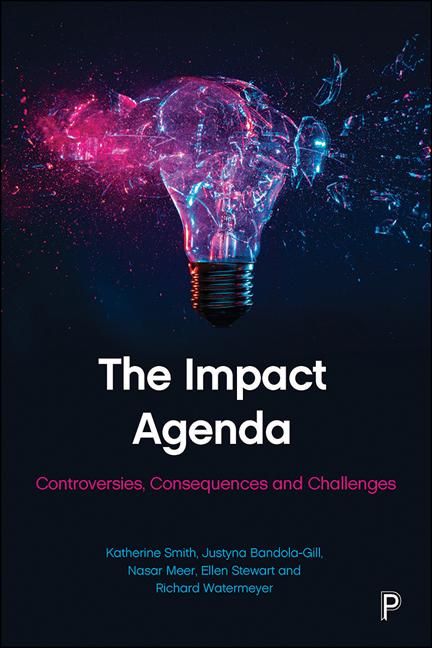Book contents
- Frontmatter
- Contents
- List of figures, tables and boxes
- List of abbreviations
- Notes on authors
- Acknowledgements
- 1 Introduction: Critical Reflections on Research Impact
- 2 The Rise of Research Impact
- 3 Debating the UK Impact Agenda
- 4 Do Experiences and Perceptions of Research Impact Vary by Discipline?
- 5 Impact on whom? Contrasting Research Impact with Public Engagement
- 6 Public Intellectualism and the Impact Agenda: International Perspectives
- 7 Academic Life in the Impact Vanguard: The View from Knowledge Exchange Organisations
- 8 Looking Back: Evolving Public Health Perspectives on Research Impact
- 9 Telling Tales of Impact: As Seen Through the Eyes of User Assessors
- 10 Conclusion: What Would an Evidence-Informed Impact Agenda Involve?
- References
- Index
6 - Public Intellectualism and the Impact Agenda: International Perspectives
Published online by Cambridge University Press: 23 February 2021
- Frontmatter
- Contents
- List of figures, tables and boxes
- List of abbreviations
- Notes on authors
- Acknowledgements
- 1 Introduction: Critical Reflections on Research Impact
- 2 The Rise of Research Impact
- 3 Debating the UK Impact Agenda
- 4 Do Experiences and Perceptions of Research Impact Vary by Discipline?
- 5 Impact on whom? Contrasting Research Impact with Public Engagement
- 6 Public Intellectualism and the Impact Agenda: International Perspectives
- 7 Academic Life in the Impact Vanguard: The View from Knowledge Exchange Organisations
- 8 Looking Back: Evolving Public Health Perspectives on Research Impact
- 9 Telling Tales of Impact: As Seen Through the Eyes of User Assessors
- 10 Conclusion: What Would an Evidence-Informed Impact Agenda Involve?
- References
- Index
Summary
Previous chapters have offered a critical review of the research impact agenda, situating it within international efforts to improve research utilisation for key groups including academics, research funders, ‘knowledge brokers’ and research users. This chapter considers where public intellectualism rests within these concerns. Specifically, the chapter explores the multiple public spheres that make up space between the academy and politics by focusing on: (i) three established academics working within the social sciences who engage outwardly in ways that might be described as ‘public intellectualism’; and (ii) three established academics who work closely with external policy audiences on a range of recognised public policy ‘problems’, who we refer to as ‘academic interlocutors’. These in-depth interview accounts from leading academics working in Australia, Canada, the USA and the UK allow us to continue the work of Chapter 5 in exploring the kinds of externally facing practices that are facilitated through the UK’s approach to impact, compared to the kinds of practices being supported in other contexts with an established interest in knowledge exchange and research utilisation. Since the literature on public intellectualism is distinct from much of the literature on which this book has drawn so far, this chapter begins by briefly reviewing some of the key contributions to this literature. This allows us to situate the analysis in this chapter within these broader discussions, including by considering the elementary question of whether (and if so, how) notions of public intellectualism and impact are perceived to be complementary. The international perspectives included in the data in this chapter allow us to reflect on how developments in the UK are perceived by externally engaged academics elsewhere.
Which public and what intellectual?
In the opening sentence of his seminal essay on the relationship between social scientific inquiry and political positioning, the late Howard Becker maintained that researchers will routinely ‘find themselves caught in a crossfire. Some urge them not to take sides, to be neutral and do research that is technically correct and value free. Others tell them their work is shallow and useless if it does not express a deep commitment to a value position’ (Becker, 1967: 239).
- Type
- Chapter
- Information
- The Impact AgendaControversies, Consequences and Challenges, pp. 115 - 136Publisher: Bristol University PressPrint publication year: 2020



